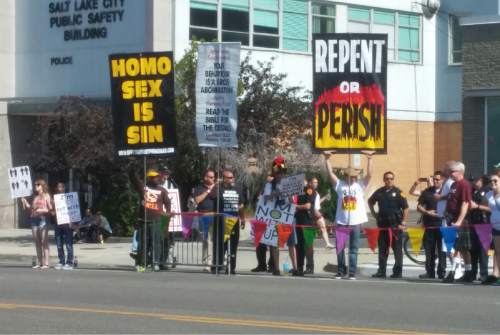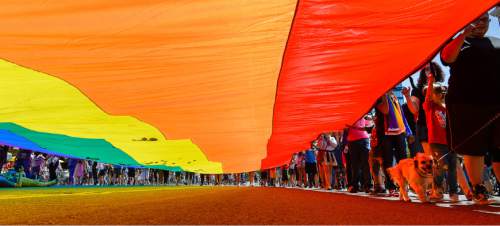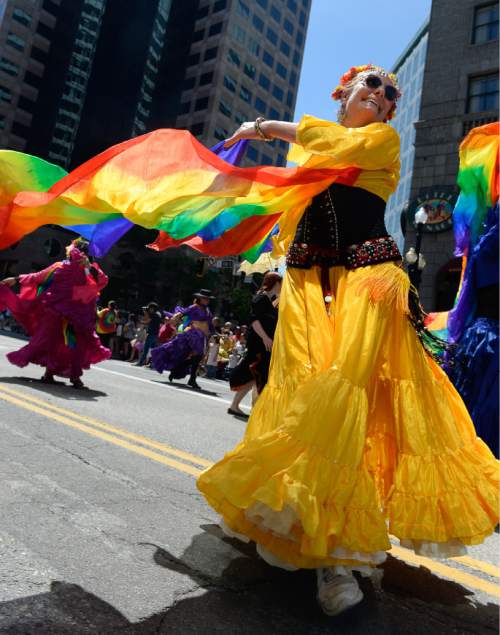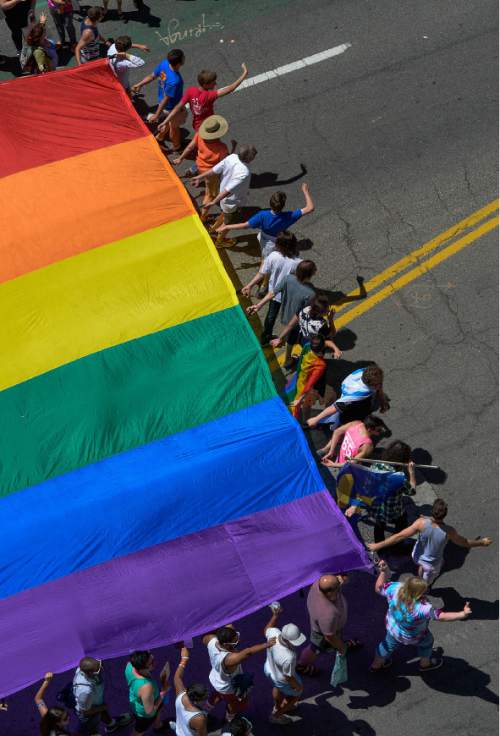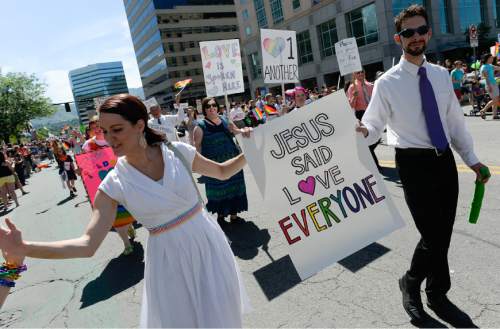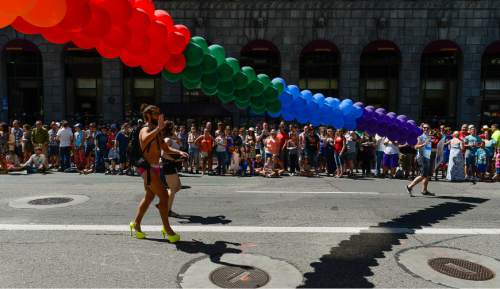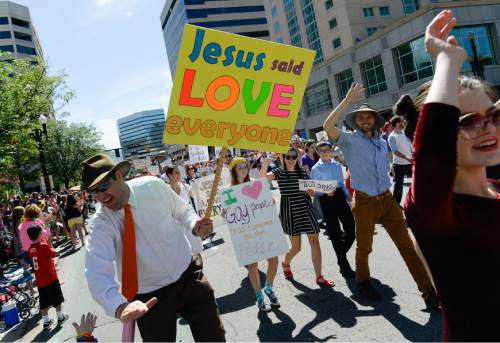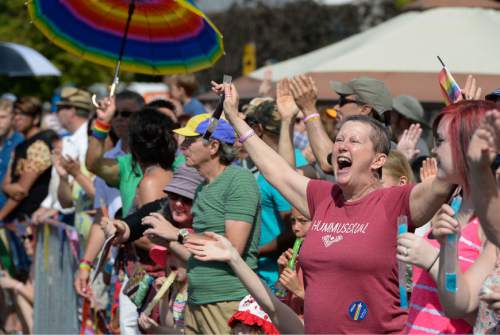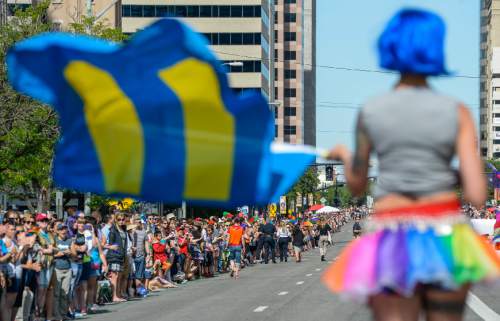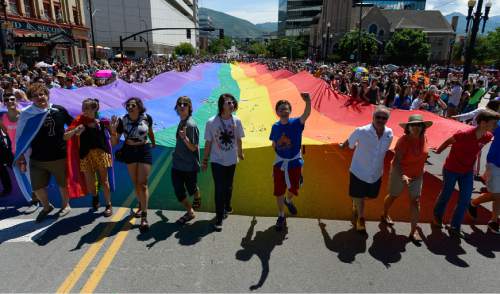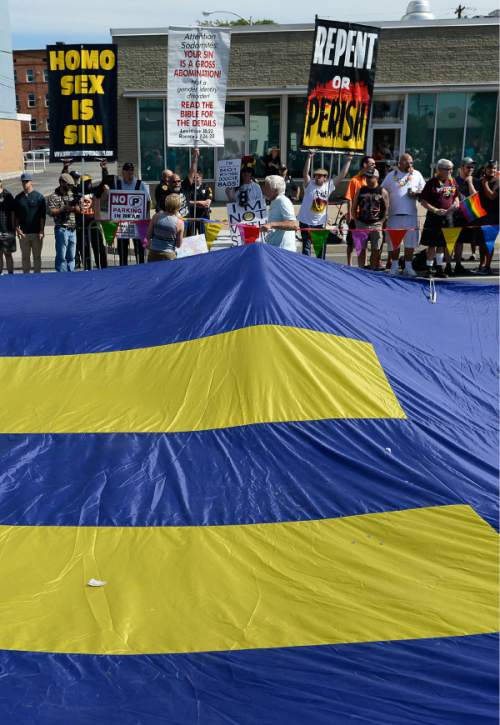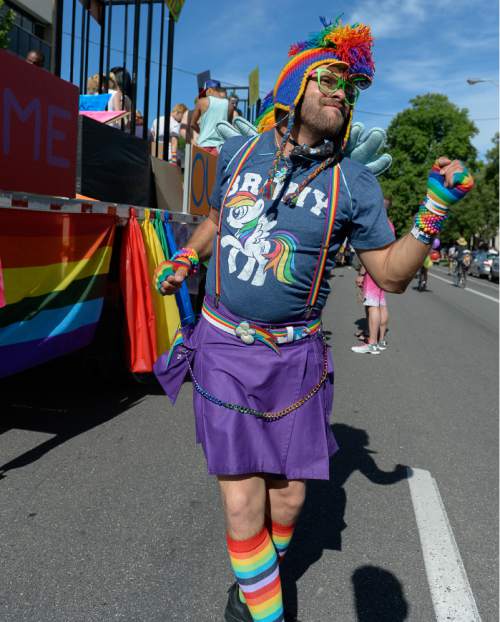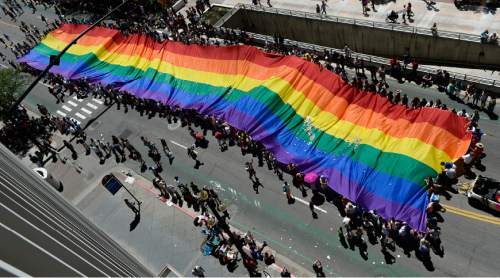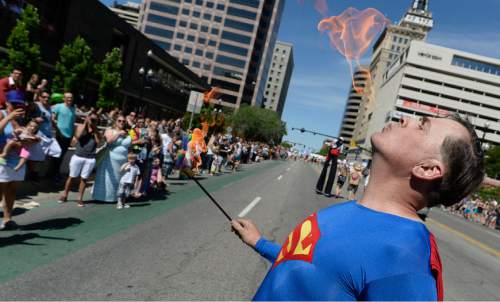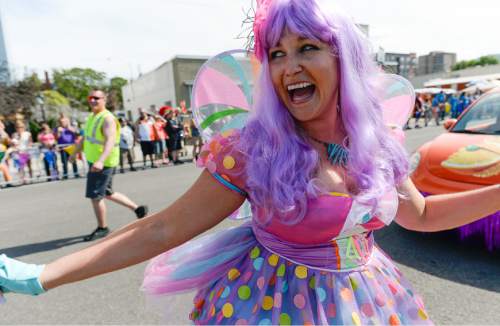This is an archived article that was published on sltrib.com in 2015, and information in the article may be outdated. It is provided only for personal research purposes and may not be reprinted.
Utah's LGBT community had a lot to celebrate at this year's pride festival, and they did it with thousands of friends at Sunday's Pride Parade, the capstone of the three-day festival.
Thousands of gays, lesbians, transgenders, allies, protesters and spectators lined both sides of 200 South to watch as rainbow flags and colorful floats made their way through downtown Salt Lake City.
Multiple same-sex couples were married on different floats during the two-and-a-half -hour parade with its 154 entries. Organizers estimated the parade had roughly 35,000 attendees this year.
Janet Mock, an author and transgender woman who advocates for transgender rights and hosts "So Popular!" on MSNBC, was the parade grand marshal.
Girl Scout Troop 1161, which is sponsored by the Utah Pride Center and welcomes girls from gay and transgender families or who themselves identify as LGBT, led the parade.
Marching just behind a rainbow flag bearing the Utah state seal and the American flag, the six girls waved enthusiastically at the crowds that lined the parade route.
The group voted unanimously to participate in the parade and were honored to lead the event, troop leader Olive Cloe said.
"Pride is… beautiful love!" a poster made by the girls for the parade announced.
This weekend's celebration was the first since the Supreme Court last fall refused the state of Utah's appeal of a federal ruling striking down its ban on gay marriage and also the first since Utah lawmakers this year passed legislation protecting gays from housing and employment discrimination.
The parade included plenty of politicians and political hopefuls. Among them: Salt Lake City Council candidate Derek Kitchen, who was one of the six plaintiffs who sued the state of Utah — and won — over its law barring same-sex weddings, and mayoral candidate Jackie Biskupski, who was the first openly gay politician elected to the House of Representatives.
Salt Lake County Mayor Ben McAdams waved at the crowd from his orange campaign bus and the Salt Lake County Council rolled down the parade route on a fire truck.
Sen. Jim Dabakis, D-Salt Lake City, who is currently the only openly gay person in Utah's Legislature, was also in the parade and was honored this year with the Pride Center's Pete Suazo Political Action Award for his work in state government, including pushing the LGBT antidiscrimination legislation.
Army photographer Kaily Brown included Sunday's parade as part of her visit home to Utah from Maryland, where she is stationed and lives with her wife, Jesseca Brown.
For Kaily Brown, pride is strongly associated with the idea of freedom — her own and the freedom the military preserves for others.
"It's the pride in being who you are and in having the ability to be open," said Brown, who has served two tours in Afghanistan. "I joined under Don't Ask, Don't Tell, so I was not always allowed to be open."
Brown said she also appreciates that Salt Lake City is such an accepting place for members of the LGBT community.
"It rivals San Francisco," she said. "I love Salt Lake City. You can be yourself here."
Kathy Hawkins whose daughter, Tanya, is a lesbian, was standing on the parade route as an ally. "Pride is knowing you can go anywhere, be respected, be yourself and not be condemned. "
Peggy Kjelstrom, 71, and her partner, Ingrid Davis, 67, both are members of Sage Utah, a program for gay elders.
"Pride means that I can be myself without hiding it," Davis said. "My parents know I'm gay, but we don't talk about it."
Dana Cazier, of Ogden, attended the parade for the first time on Sunday and was one of many in the crowd sporting a T-shirt emblazoned with the message "I [love] My Counterfeit Family," with a row of hearts in rainbow colors standing in for the word love.
It's a reference to remarks made by the late L. Tom Perry, an apostle of The Church of Jesus Christ of Latter-day Saints, who warned against the dangers of "counterfeit and alternative lifestyles" in an April conference speech.
An active Mormon, Cazier said she loves her church, but also supports her 26-year-old daughter who came out as lesbian six years ago and then married after the Dec. 20, 2013, federal court ruling that legalized same-sex marriage in Utah.
"Pride is family," the 51-year-old mother said. "I love and support them no matter what."
Cazier said she also takes pride in the changes to Utah's laws that have allowed her daughter to marry and protect the LGBT community from discrimination in housing and employment.
"We get such a bad rap for so many things," she said. "It's nice that we are being a shining example on this one."
Active LDS Church members not only watched from the parade's sidelines, they also marched to show their support. Erika Munson co-founder of Mormons Building Bridges said her group — marking its fourth-annual appearance in the parade — had 400 marchers.
Not everyone at the parade was there to support the LGBT community.
Ruben Israel, a member of Bible Believers church, came from Los Angeles with a group to protest the parade. "We're shocked after the Mormons helped us with Proposition 8 that so many gay people are prancing in the streets of Utah."
John Heinerman, a native of Salt Lake City, said he supports the word of God and has protested the parade each year.
"I'm the only Mormon to protest the parade year after year," Heinerman said. "Utah is becoming like California. The founders of the Mormon church are rolling over in their graves. This is an abomination against God."
Twitter: @ShaheedMo
-Tribune reporter Jennifer Dobner contributed to this report.


